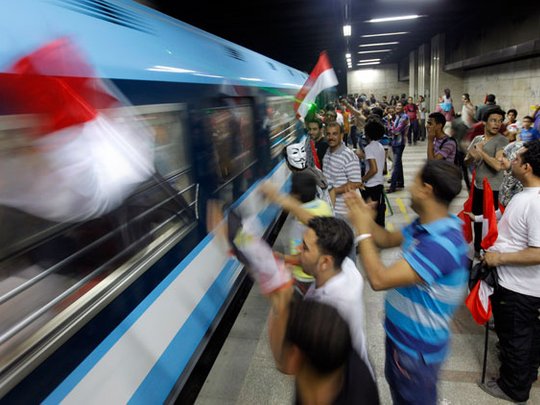
A tweet that I sent from my account (‘Looking at the crowds in Egypt’s streets, it seems that the giant has marched out of the cave’) referring to the millions of Egyptians marching in the streets on July 26, got me a reply from a false account. It said: ‘Why don’t you look at Al Jazeera... you will find a big crowd supporting Mursi! The deposed elected president?’
This tweet made me realise something: If you are supporter of Mohammad Mursi, watch Al Jazeera TV and you will be satisfied; if you are a supporter of the new regime in Egypt stick to Al Arabiya. This makes one think about the deep involvement of Arab media in the ongoing events in the region.
Social media has also joined the battle by either exaggerating some news or faking it altogether, according to what individuals like to believe.
A receipt for thousands of Egyptians pounds was presented on Twitter, alleging that the money went into buying sweets and confectionary for the interim Egyptian president.
Another alleged copy of a cheque — very vaguely written — showed that millions of dollars were paid to the Egyptian army to engineer the move against Mursi.
To ordinary Arab viewers, such news is very confusing. Even reports about the protester death toll in the Egyptian streets are conflicting; nobody knows for sure who killed these people or even to which group they belonged.
It is accepted that facts are hard to obtain during conflict. It is said that the first casualty in war is the truth, and what we are witnessing in Egypt is an undeclared war and definitely a media war.
It should be observed that Al Jazeera and Al Arabiya theoretically belong to the same camp. Gulf countries own the two gigantic media networks. I once wrote that the Gulf Cooperation Council (GCC) states have bought a lottery ticket in supporting the outcome of the Arab Spring, but not an insurance policy to go with it!
Some of my words have seen fruition. The elite of the Arab Spring have changed in Cairo and soon this will happen in Tunisia as well. The first rush to power was by Islamist groups, which failed because of malpractice and divisive policies. Now, the mass movements in the streets against their policies have started to gain momentum as we are witnessing in Egypt and Tunisia.
Likewise, the Europeans and the Americans made a blunder in hastily supporting the emerging power dominated by the Muslim Brotherhood as a permanent one. It soon became obvious it was not, but accepting this simple fact is hard.
Given that the recent events in the Arab world have divided regional media and public opinion, the position of the GCC as a coherent group in maintaining regional stability can be weakened. The big regional powers — Egypt and Syria — are in a mess, and going through a period of uncertainty.
Unified stand
The only powers in the region which can influence events are the Gulf states, but to do so unified policies towards what is going on are needed. So far, this unified stand has not emerged.
To manage the regional balance of power in the absence of a local big power needs imagination and action. Although action is being taken by financially supporting Egypt and the Syrian revolution — the amount of money pledged for Egypt’s new government is huge at $12 billion (Dh44.04 billion) — this is not backed by unified policies on the ground or a coherent initiative.
We can see envious Europeans and Americans coming and going to Egypt, but no Gulf official is stepping in, at least to hear the views of the different political groups in an attempt to bridge the divisions in the camps. There is a historical opportunity to play a role in the events.
Coordination of Gulf policies is urgently needed on two fronts — media and diplomatic. Pouring in money is not the only way to positively influence events on the ground. On the contrary it could, with no coherent long-term strategy, inflame the situation and backfire.
From what we are witnessing in the media so far, there is no common understanding within Gulf countries about the current events. It is hoped these issues will be discussed threadbare in the consultation summit to be held in Riyadh later this month.
Mohammed Alrumaihi is a professor of political sociology at Kuwait University.








